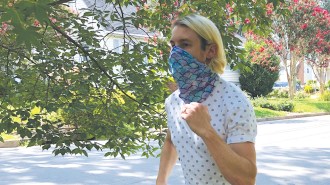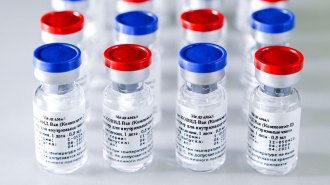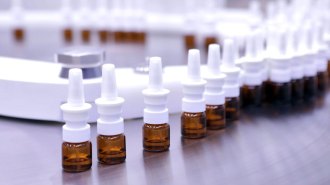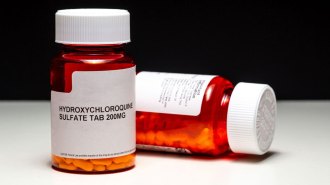Health & Medicine
-
 Health & Medicine
Health & MedicineNew treatments aim to treat COVID-19 early, before it gets serious
Some new drugs that may stop the coronavirus from getting into cells, or from reproducing itself, may treat the illness as soon as it’s diagnosed.
-
 Health & Medicine
Health & MedicineDust can spread influenza among guinea pigs, raising coronavirus questions
In three out of 12 guinea pig pairs, an animal coated in influenza virus, but immune to infection, spread the virus to another rodent through dust.
-
 Climate
ClimateHurricanes have names. Some climate experts say heat waves should, too
A newly formed international alliance aims to raise awareness about extreme temperatures and protect vulnerable populations.
By Jack J. Lee -
 Health & Medicine
Health & Medicine4 reasons you shouldn’t trash your neck gaiter based on the new mask study
Despite news coverage to the contrary, the study was meant to figure out how to evaluate masks, not actually do the comparison.
-
 Health & Medicine
Health & MedicineHere’s what we know about Russia’s unverified coronavirus vaccine
Despite incomplete testing, Sputnik V may be the first COVID-19 vaccine given to the general public, rolling out initially to teachers and doctors.
-
 Health & Medicine
Health & MedicineHow two coronavirus drugs for cats might help humans fight COVID-19
Scientists are exploring if drugs for a disease caused by a coronavirus that infects only cats might help also people infected with the coronavirus.
-
 Anthropology
AnthropologyBetter playground design could help kids get more exercise
Playgrounds designed for imaginative play can make a difference in how much kids move
By Emily Anthes -
 Climate
ClimateEmissions dropped during the COVID-19 pandemic. The climate impact won’t last
New estimates suggest coronavirus shutdowns cut global carbon dioxide emissions from fossil fuels by nearly 30 percent, on average.
-
 Health & Medicine
Health & MedicineRogue immune system reactions hint at an early treatment for COVID-19
A comprehensive look at the immune system shows multiple ways it misfires in COVID-19. Treating with interferon early might prevent trouble later.
-
 Health & Medicine
Health & MedicineFive big questions about when and how to open schools amid COVID-19
Researchers weigh in on how to get children back into classrooms in a low-risk way.
-
 Health & Medicine
Health & MedicineHeavy drinking drove hundreds of thousands of Americans to early graves
From 2011 to 2015, more than 93,000 U.S. deaths per year could be tied to excessive alcohol use, researchers say.
-
 Health & Medicine
Health & MedicineHydroxychloroquine can’t stop COVID-19. It’s time to move on, scientists say
Hydroxychloroquine doesn’t work as antiviral or a treatment for COVID-19, an abundance of scientific data suggest.